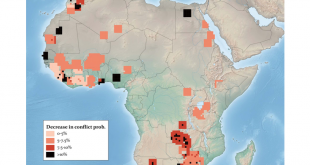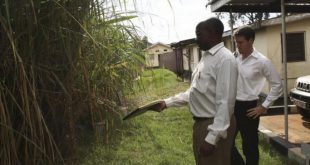Guest post by Jeff Mosenkis of Innovations for Poverty Action. Above: Maintaining attention for a long interview is always a challenge Fake news is already disrupting Kenya’s election. Qualtrics, the research software company, did a randomized experiment testing the kinds of extra questions researchers embed in surveys to make sure respondents are paying attention and answering thoughtfully. They found including those questions earlier in a survey actually led to respondents performing...
Read More »IPA’s weekly links
Guest post by Jeff Mosenkis of Innovations for Poverty Action. We don’t do enough thinking in the U.S., much less in developing countries, about end of life “palliative” care, helping people with difficult terminal illnesses suffer less. But a lot of suffering happens at the end of life; if your goal is to alleviate suffering, pain management is doable. The BBC has a very interesting story of the woman who singlehandedly brought palliative care to Mongolia. David Evans summarizes a post and...
Read More »IPA’s weekly links
Guest post by Jeff Mosenkis of Innovations for Poverty Action. Three relatively recent additions to development Twitter worth noticing if you haven’t already, Tavneet Suri, Nava Ashraf, Seema Jayachandran. Here’s proof from just this week: There’s a new website devoted to making development research easily accessible, VoxDev.org. Editor Tavneet Suri says: Here is our vision: We want to bring cutting-edge research to the forefront of decision making – for policymakers, the private sector,...
Read More »IPA’s weekly links
Guest post by Jeff Mosenkis of Innovations for Poverty Action. It’s a puzzle why more people don’t use long-acting reversible contraceptives like IUDs or hormone shots. Berk Ozler reports on qualitative findings from Cameroon about why adolescent girls don’t seem interested in them. A new working paper suggests that how refugees fare economically in the U.S. is heavily dependent on at what age they arrive, perhaps because learning English is easier if they come earlier. The authors estimate...
Read More »IPA’s weekly links
Guest post by Jeff Mosenkis of Innovations for Poverty Action. I know this week for many of us it’s been hard to pay attention to what else has been going on in the world, what with the release of Stata 15 and all, but I’ll try to help with some stuff you may have missed: The World Bank’s Hedy Sladovich &Emanuela Galasso put together several very accessibly written one-paragraph summaries of recent findings on what works in early childhood development. It pairs nicely with this (mostly...
Read More »IPA’s weekly links
World Bank Chief Economist Paul Romer is giving up some of his management duties, in part due to frictions over trying to get researchers to communicate better, pressuring them to create shorter presentations and use fewer run-on sentences (like this one). Bloomberg and FT’s reports seem gossipy and read like only part of the story. Romer has responded with a post on his personal blog, and offered a public mirror of the internal blog he uses to communicate with World Bank staff. Taking on...
Read More »IPA’s weekly links
Guest post by Jeff Mosenkis of Innovations for Poverty Action. An attempt to measure and rank the most effective ways to reduce CO2 in the atmosphere ranked educating girls and family planning (globally) above green energy. Fewer unplanned births means fewer carbon footprints. (h/t Osman Siddiqi) On Monday, President Trump expanded the “global gag rule” to mean no funding can go to any NGO that also discusses abortion with beneficiaries anywhere in their operations. This expansion grows its...
Read More »IPA’s weekly links
Guest post by Jeff Mosenkis of Innovations for Poverty Action. Chris Blattman had a nice interview with Stephen Ladek of the Terms of Reference podcast (iTunes). Chris talked about his approach to what RCTs are good for – less about that specific program but more about testing our assumptions behind the mechanism through which something might work. They also get into how he got started studying conflict and resolution (because someone offered to let him borrow some Land Rovers), but why he’s...
Read More »IPA’s weekly links
Guest post by Jeff Mosenkis of Innovations for Poverty Action. The datasets above all have the same means, SD, and correlations explain Justin Matejka & George Fitzmaurice of Autodesk in a modern update of Anscombe’s Quartet. But the lesson is the same – always plot your stuff. (h/t everybody) Jobs postings: Summer jobs with Busara Center, full-year with Michael Clemens, and many at the IPA/J-PAL (and several other orgs) jobs portal. Podcasts: Tyler Cowen talks with Cardiff Garcia on FT...
Read More »A tale book-ended by two Trudeaus: Canada’s foreign aid since 1970
Soon after the 2015 federal election, Prime Minister-designate Justin Trudeau affirmed that Canada was back as a “compassionate and constructive voice in the world” after a decade of Conservative governments. One of the most important means by which any industrialized country interacts with the developing world is via the amount, composition and effectiveness of its foreign aid, which can help boost human and economic development, mitigate humanitarian crises and reduce environmental...
Read More » Heterodox
Heterodox








